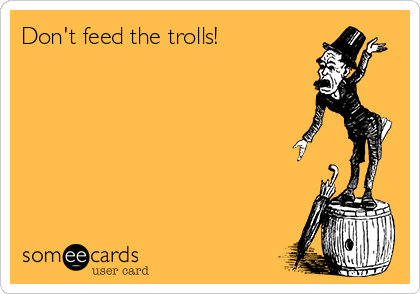
1. TIGHTEN YOUR SECURITY
Set the privacy settings on your account so that they are as secure as possible for what you wish to achieve.
2. ALWAYS BLOCK & REPORT
Block trolls as abusive, mark for spam or flag comments as inappropriate. Normally the site’s support group will look at the troll’s activities to check your claim and do the necessary actions.
3. NEVER FEED A TROLL
Do not react, however inflammatory their comments are. They will rapidly lose interest if they don’t get a response.
4. STAY ON TOP OF TWITTER
If a troll bothers you on Twitter, go to their profile, block them and report them as spam. Twitter are getting better at responding to such complaints and should act quickly if they can see that someone is being a nuisance.
5. REMOVE FRIENDS
On Facebook, filter your list of friends. Cull anyone that you do not actually know and protect yourself by tightening your privacy settings.
6. BE PROFESSIONAL
If you are managing a Facebook page for a business, report and block any trolls that leave damaging or disruptive comments on your wall. Do NOT respond to the comments.
7. INFORM OTHERS
Always let your friends or followers know NOT to respond to the troll as well.
8. UNDERSTAND THE RULES
Whatever social network, forum or chatroom you are using, make sure you read their terms & conditions and look at the section on abusive behaviour.
9. BE PERSISTENT
Trolls will be persistent so you need to be too. Many trolls make new accounts after being blocked. Constantly block them if they pester you, continue to NEVER respond no matter how frustrating it becomes and consider using a third party application such as TweetDeck or Slipstream as a filter.
10.ASK FOR HELP
If you are unsure of what to do or how best to proceed, seek advice. You can contact digital experts FlexyWeb or social media experts Shake Social on 0115 958 5969.
